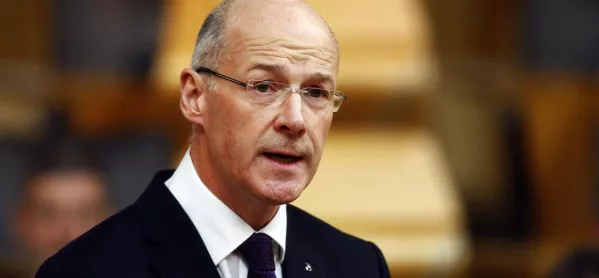The debate over the apparent narrowing of the curriculum in Scottish schools rages on. But today the education secretary John Swinney ruled out dictating to schools and councils the number of course choices pupils must have access to in S4.
Earlier this month, MSPs agreed that an evaluation should be carried out of how the Scottish curriculum - Curriculum for Excellence (CfE) - is being implemented in schools.
The review follows concerns raised at the Scottish Parliament’s Education and Skills Committee that subject choice in S4 has narrowed under CfE, with the greatest subject choice restrictions hitting pupils in deprived areas.
However, speaking at the Scottish Secondary Teachers’ Association (SSTA) annual congress in Crieff today, Mr Swinney ruled out dictating to schools whether they should offer six, seven or eight subject choices in S4.
He argued that would “undermine” Curriculum for Excellence which sought to hand more power over the curriculum to schools, would be “a retrograde step”, and nothing could persuade him to do it.
More from the education secretary at SSTA: ‘Culture of fear’ is driving excessive teacher workload, admits Swinney
SSTA general secretary: Pressure to cut exclusions ‘puts teachers at risk of violence’
SSTA president: Verbal abuse from pupils ranked top ‘stress-inducing factor’, by union leader
Mr Swinney said: “There is a lot of debate going on about whether it is right to have six, seven or eight subject choices in S4 - which is roughly the nub of the issue - and part of the charge put at me is: you should be prescribing.
“Now, you see, I am not prepared to do that. Nothing will persuade me because I don’t believe on that axis of debate between central and local that I know better than you, than your schools, whether you should be doing six, seven or eight because you are the professionals, you are facing the young people, you are the ones engaging with the young people to determine what they need and in every respect the imposition of a fixed directive central model is the anathema and contradiction of our curricular approach.”
He added: “Our curricular approach is not a prescriptive approach. The profession as part of the national debate related to Curriculum for Excellence argued for more flexibility, argued for more autonomy, argued for more choice about the curriculum. So if our response was to say ‘this is the way it should be done’, to me, we undermine some of the fundamental thinking in terms of Curriculum for Excellence and I think that would be a retrograde step.”




